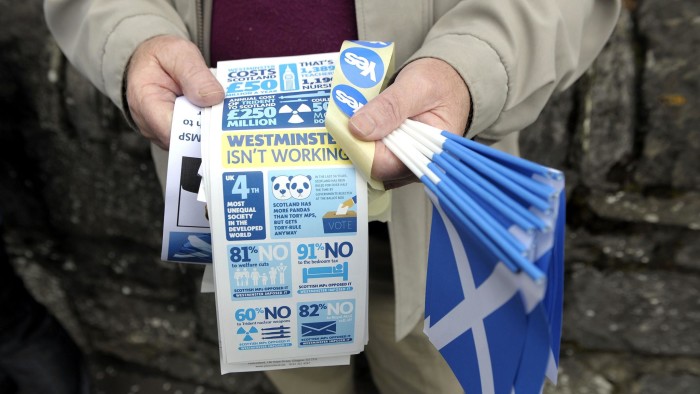A quick guide to the Scottish referendum

Roula Khalaf, Editor of the FT, selects her favourite stories in this weekly newsletter.
Scotland will vote on September 18 on whether to become independent from the rest of the UK and end a 307-year-old union with England.
Why is Scotland holding this referendum?
The Scottish National party, which has been committed since its founding in 1933 to independence from the UK, won an unprecedented majority in the devolved Scottish parliament in 2011. The SNP’s manifesto included a pledge to pass a bill clearing the way for a referendum and the UK government under David Cameron, prime minister, accepted that one should be held.
What would happen after a Yes vote?
Both UK and Scottish government leaders say even a narrow Yes vote in the referendum on September 18 would be decisive and would set Scotland on the road to independence. The two governments have committed to work together constructively in the best interests of both sides and a Yes vote would lead to negotiations on the terms of separation. Some analysts say uncertainty over Scotland’s currency arrangements could lead to capital flight, but the Bank of England has said it has prepared contingency plans and would “discharge its responsibilities” in ensuring the financial system’s stability.
When would Scotland become independent?
The Scottish government has proposed that independence should take effect on March 24, 2016.
Opponents have argued that this would not leave enough time to complete complex negotiations on such issues as division of UK assets and liabilities or EU membership. The timing of independence day would depend in part on whether Scotland and the UK sought to resolve all institutional, bureaucratic and legal issues beforehand or accepted that some would have to be resolved after legal separation.
FT Interactive
Scottish independence poll tracker

As Scotland prepares to vote on independence, the FT takes a closer look at polling data in an interactive poll of polls
Explore graphic
Would an independent Scotland keep the pound?
The SNP proposes that an independent Scotland continues to use the pound under a formal currency union with the remaining UK. All three main Westminster parties have rejected formal currency union, though Nationalist leaders say the advantages of sharing the pound are such that they would quickly abandon this stance after a Yes vote. If they did not, Scotland could continue to use the pound without formal currency union, an approach known as “sterlingisation”. Or it could introduce a new currency, either pegging it to the UK pound or allowing it to float.
Would an independent Scotland be a member of the EU?
There is no precedent in the EU for the agreed independence of part of a member state that wishes to remain in the union as a separate member. The SNP is strongly committed to continued membership and argues that this could be negotiated before its proposed independence day. Some EU leaders, including former European Commission president José Manuel Barroso, have suggested independence would mean Scotland being removed from the EU and facing a potentially difficult re-entry process.
But some experts say the EU is unlikely to want to cast 5.3m European citizens into legal limbo and to throw into doubt the complex web of economic and social links that tie Scotland into the union. Most participants in the independence debate assume Scotland would end up as an EU member, but they differ widely on how long this would take, what the terms of membership would be and what kind of temporary arrangements might be used to bridge an interim period before membership was secured.
In depth

Scotland will decide in a referendum to be held on September 18 2014 whether or not to end the 307-year-old union with England
Further reading
Would an independent Scotland retain the monarchy?
The SNP says Queen Elizabeth would continue to be Scotland’s monarch under a new written constitution, as she is for many other countries previously part of the British empire. Opinion polls suggest public support for retaining the monarchy. However, some members of the party and of other pro-independence groups hope that Scotland will become a republic and say the issue should be put to voters after independence.
What would happen after a No vote?
All three main UK parties have promised that they would quickly begin work to devolve further powers over tax and some aspects of welfare to the Scottish parliament. The Conservatives and Liberal Democrats say they would give Scotland full control over the rates and bands of income tax. Labour has a more cautious proposal, saying Scotland should have the ability to change the rate by up to 15p for all income tax bands, but should be barred from cutting rates for high-income earners alone. The SNP says such powers are inadequate and there is no guarantee they would be delivered once UK parties’ attention shifted to other issues after a No vote.
There is no consensus among the main Westminster parties over the UK’s long-term constitutional future and there is likely to be continued discussion over the role of Scottish members of the Westminster parliament.
Comments